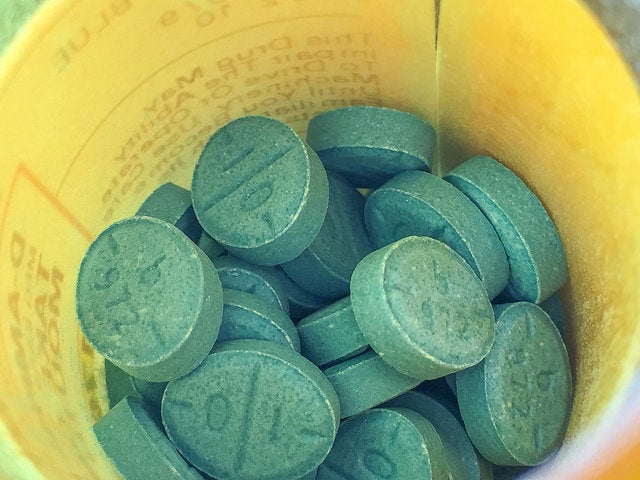A recent report from the White House claims there are proven harms associated with over treating children with medications for depression or attention-deficit hyperactivity disorder, also known as ADHD.
Health Secretary Robert F. Kennedy Jr.’s “Make America Healthy Again” report blames ultra-processed foods, environmental chemicals, lack of physical activity, chronic stress and excessive use of prescription drugs as culprits for chronic diseases in children.
Reporting from the news organization NOTUS found some studies cited in the report did not exist, including one citation referenced to argue that direct-to-consumer advertising leads parents to overestimate ADHD prevalence and inappropriately request drugs for the disorder.
News with a little more humanity
WPR’s “Wisconsin Today” newsletter keeps you connected to the state you love without feeling overwhelmed. No paywall. No agenda. No corporate filter.
Kennedy’s criticism of the use of medication for ADHD comes as the Trump administration has placed drugs for this disorder under additional scrutiny. Kennedy has claimed the medications are overprescribed and are “poisoning” children.
James Li is the A. A. Alexander Associate Professor of Psychology and an investigator at the Waisman Center at the University of Wisconsin-Madison. He told WPR’s “Wisconsin Today” that Kennedy’s statements on the harms of medications like Adderall aren’t based in science.
“The evidence is quite clear that the medications that are currently FDA-approved and prescribed to treat ADHD in particular are fairly well tolerated. They don’t lead to early mortality … and they are generally very beneficial when used properly under doctor’s orders,” Li said.
Kennedy has repeatedly dismissed the role of genetics in explaining the rise of diagnoses of disorders like ADHD and autism, arguing it is due to environmental factors.

Li said that the environment does play a role in mental health conditions in children.
“But it shouldn’t be the only thing that we think about when it comes to intervention,” he said. “It should be in concert with how we can also address the underlying biology that we currently know of that’s quite relevant to these disorders.”
Li talked about the science behind testing for ADHD and where research on the disorder is going next.
The following was edited for clarity and brevity.
Kate Archer Kent: Why are stimulants like Adderall and Ritalin an effective way to treat and to manage ADHD?
James Li: [Stimulants] are basically a class of drugs that target two neurotransmitters in the brain: dopamine and norepinephrine. The reason why they’re so effective at treating symptoms of ADHD, specifically in attention and focus, is because they target the parts of the brain that regulate executive functions: decision making, working memory and focus. That’s what dopamine does, it’s like the reward chemical of your brain and it lights up whenever we do something that we’re really interested in. By targeting this particular pathway, we’re able to light up the parts of our brain that’s focusing on whatever it is that we’re focusing on. The other neurotransmitter is norepinephrine, which has a sort of similar neurochemical component to it as dopamine.
The downside of these types of medications, though, is that you have to take them every day for the effects to take hold. There is an abuse potential associated with these particular drugs … but when they’re prescribed and used [as directed], at a dosage that’s meant to be therapeutic, [they]have a very low potential for abuse.
KAK: Health Secretary Kennedy has claimed that environmental factors may be behind the rise in autism and other conditions. How do environmental factors affect the likelihood of someone developing ADHD?
JL: That’s a very large component of what underlies the development of ADHD over time. Not just your biology and your genetics, which do play a huge role, but so does your environment and the environment that you’re raised in.
From the research that I’ve done in my lab, we’ve shown that parenting style, parenting behaviors and parental monitoring plays a pretty big role in affecting the way that your genes work. The genes that you might carry for ADHD are more likely to be expressed under environmental conditions that are a little bit more lax and or perhaps adverse. We’ve also found that exposure to early childhood traumas and adversities also increases a child’s risk for developing ADHD.
Again, this is in concert with their biology. So it’s really a matter of not just one or the other, which I think our health secretary seems to be conflating saying that it’s really more of an environmental thing. It’s both. And not just both — it’s the interactions between the two and how your biology and your genetics interact with the environments that you’re in.
KAK: Where is the research headed in ADHD? What does the Weisman Center want to focus on next?
JL: Right now, we have a very big study that’s looking at ADHD as a co-occurring condition with other neurodevelopmental disorders. That’s where the field is headed: thinking about ADHD not just as its own thing, but kind of as part of other co-occurring conditions for which ADHD tends to show up in so many different conditions as well.
ADHD is part of a constellation of other conditions in the DSM (Diagnostic and Statistical Manual of Mental Disorders) that are called neurodevelopmental disorders. Included in them is autism. We know that among the autistic community, roughly 50 percent of them struggle with ADHD and ADHD-like traits. It’s one of the biggest co-occurring conditions that autistic individuals struggle with the most. We know very little about how to treat ADHD in individuals who have these co-occurring conditions like autism.
There’s a meta analysis that came out a couple years ago that showed that autistic kids who were given stimulant medications to treat their ADHD symptoms actually had more adverse events and adverse risk profiles as a result of taking these medications, which are FDA approved and supposed to be safe. But these autistic kids who were given these medications actually did not fare better, and in many cases actually fared worse because they experienced a lot more adverse risk profiles as a result of taking the medication — which would suggest that these traditional medications that we’re using to treat ADHD may not actually be effective in treating ADHD for certain individuals.






